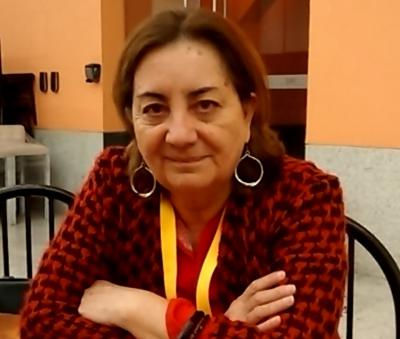By Flavia Fascendini Publisher: APCNews
Published onPage last updated on
 The executive director of APC member Instituto DEMOS Guatemala, Anabella Rivera, was interviewed in Mexico by APCNews. She offers her perspective on APC’s milestones over the last 25 years and her expectations as a recent member of the network.
The executive director of APC member Instituto DEMOS Guatemala, Anabella Rivera, was interviewed in Mexico by APCNews. She offers her perspective on APC’s milestones over the last 25 years and her expectations as a recent member of the network.
APCNews: Anabella, from your point of view, what have APC’s main achievements been over these years?
Anabella Rivera: I was privileged to be close to APC because of the work done by Instituto DEMOS in support of the United Nations Special Rapporteur on freedom of expression when the mandate was held by Frank La Rue. That was when I got to know women in APC from different regions in the world, and the different ways APC works in different regions, which was very enriching. If I had to sum up our biggest contribution through the rapporteurship, it was that together with APC we were able to carry out consultations in different regions of the world, especially in Africa and Europe, where APC has always shown its solidarity as well as its expertise on issues of online rights and human rights and the internet. In fact one of the most important reports delivered by Frank was on how human rights intersect with the internet. His report was taken up by a great many civil society organisations, and I think APC was probably the organisation that took on this UN report and this language more than any other, and put it into practice on a daily basis in regions around the world. I think this was a great achievement in the field of human rights and the internet.
APCNews: Anabella, what expectations does Demos have, as a new member of the APC network?
AR: We applied to be a member organisation of APC because we had seen its successful work, and we decided to find a way of being involved. In the first place, we wanted to continue with the work we have been doing with APC in the really very neglected region of Central America. DEMOS has several projects in Central America. In particular we train communicators, young people and especially women on all the issues related to freedom of expression, and introduce them to new technologies. Also, of course, we create content which they can share on the social networks. We had enormous expectations about connecting with APC for the work we carry out in this area, because we discovered that several APC member organisations do work that is synergistic with what we do at the local level, except that they do it also at a regional level. Central America is a fairly isolated region, especially the three countries of the northern triangle, Guatemala, El Salvador and Honduras, and we think that by working with APC we will be able to open up doors of opportunity in these three countries. In concrete terms, that is the expectation we hope to fulfil by joining APC as a member organisation. APC’s work on gender issues is highly successful and also extremely necessary for women in these countries, where we do not really have the opportunity to be involved and participate in global processes.


